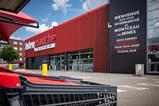Angus Soft Fruits deployed Thorvald robots using UV-C light treatment to control powdery mildew during Scotland’s exceptionally hot summer, offering a sustainable alternative to traditional fungicides while protecting crop quality and boosting yields

Scottish berry company Angus Soft Fruits says robots have given it a helping hand to protect its crops, during what was one of the hottest summers on record.
The marketer’s grower cooperative Angus Growers has employed Thorvald robots for the past couple of years to treat berry plants with ultraviolet-C light, which disrupts the DNA of powdery mildew spores and effectively controls the disease without the use of traditional fungicides.
Scotland experienced unusually hot and dry weather this summer followed by humid conditions, which apparently meant growers faced increased pressure from the fungal disease, which thrives in warm, damp environments.
According to Angela Porchez, general manager at Angus Growers, the robots provided an effective, sustainable solution that protected fruit quality and boosted yields.
“Scotland’s climate is always a challenge for growers, and this year the hot, dry days followed by humidity meant mildew became a serious threat,” she explains. “By using robots to deliver UV treatment, we’ve been able to manage this without relying solely on chemicals.
“It not only protects crop quality, but it also helps reduce input costs and supports our long-term sustainability goals. Importantly, the technology has also improved plant health and yields, which is vital for grower returns in such a competitive marketplace.”
Thorvald’s developer Saga Robotics is working with Angus Soft Fruits and its growers to introduce a number of innovative solutions that can enhance their production.
Those solutions include smaller tunnel systems, as well as drones for various tasks such as precision pollination to improve yields, logistics, and cleaning polytunnels to maximise vital light levels.
“Robotics, drones, and data are all becoming part of how we think about the future of berry production,” Porchez adds. “We see these technologies not as replacements for people, but as tools that can help us farm more sustainably, improve forecasting, and tackle challenges that are only going to increase with climate change.”








